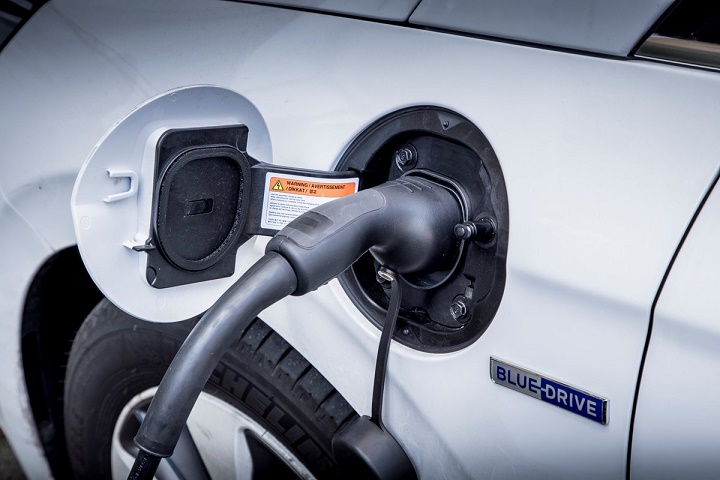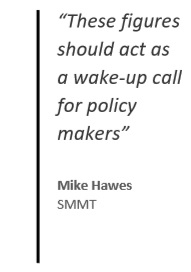
Image: SMMT
While the overall new car market declined once again in 2018, the number of new low emission registrations rose by more than 20% – but there was also an increase in carbon emissions from new cars.
Figures from the Society of Motor Manufacturers and Traders (SMMT) show that 141,270 new alternatively fuelled vehicles (AFVs) were registered in 2018, a year-on-year rise of 20.9%.
In total, 6% of all new vehicles registered in 2018 were AVFs – up from 4.6% in 2017.
However, despite this, the SMMT says carbon tailpipe emissions from new cars rose for the second consecutive year – up by 2.9% to 124.5g/km.
 The SMMT attributes the increase to the shift away from diesel and the ‘disappointing growth’ in AVFs – pointing out that diesel vehicles typically emit 15-20% less CO2 than the petrol-engined equivalent.
The SMMT attributes the increase to the shift away from diesel and the ‘disappointing growth’ in AVFs – pointing out that diesel vehicles typically emit 15-20% less CO2 than the petrol-engined equivalent.
The SMMT says environmental goals are ‘at risk’ and is calling for new policies to grow sales of new low and zero emission cars.
Overall, the UK new car market declined by 6.8% in 2018, with annual registrations falling for a second consecutive year.
Mike Hawes, SMMT chief executive, said: “A second year of substantial decline is a major concern, as falling consumer confidence, confusing fiscal and policy messages, and shortages due to regulatory changes have combined to create a highly turbulent market.
“The industry is facing ever-tougher environmental targets against a backdrop of political and economic uncertainty that is weakening demand – so these figures should act as a wake-up call for policy makers.
“Supportive, not punitive measures are needed to grow sales, because replacing older cars with new technologies – whether diesel, petrol, hybrid or plug-in – is good for the environment, the consumer, the industry and the exchequer.”
Is it quite possible that with the purchase of more and more cars by PPI., with a downpayment and several monthly payments and then an end payment or give the vehicle back and start again.
Maybe this is making more used cars more available and therefore more people are looking at them as opposed to buying new., After all the PPI cars are under guarantee with servicing etc for a minimum of 3 to 5 years and some for 7 years. That means that one can but a good as new vehicle at a 2nd hand price.
So fewer new cars are being sold as a result.
R.Craven
+2
I have written to my MP regarding the topic which Pat raised before the Christmas holidays – I am expecting a reply some time in the next three to four weeks, knowing El Government
But my question was specifically regarding grants to make Euro 5 vehicles (these have DPFs) into Euro 6.2 vehicles (with addition of SCR, etc). It’s surely a much sustainable way of doing things than me buying another car, which would be bigger, have less MPG and be Euro 6 compliant, surely?
David Weston, Corby
0
All about emissions is it? Depends on what you want to measure.
It has been said that it costs the planet more to make a new car than to continue to run an older one. The article below is worth a read if you feel the urge to get a new car just to be green.
https://www.telegraph.co.uk/motoring/green-motoring/11187483/New-or-old-which-is-greener.html
Pat, Wales
+4